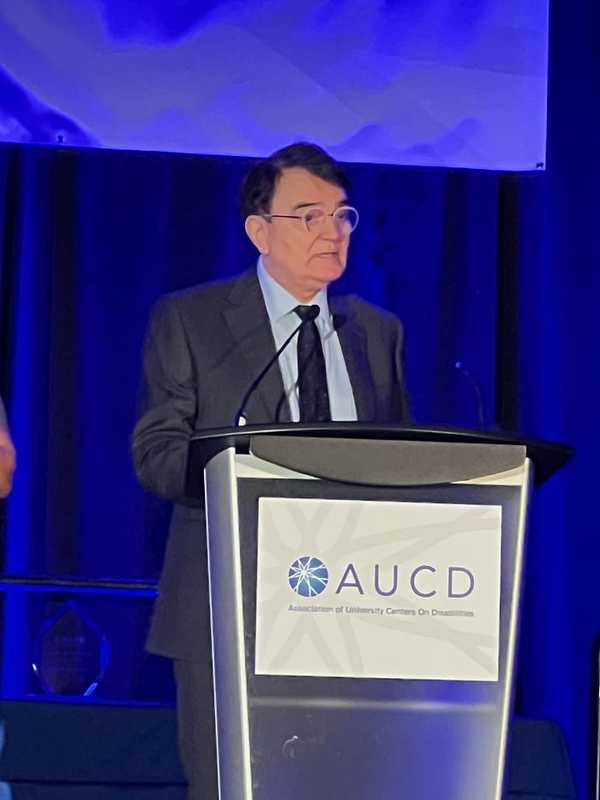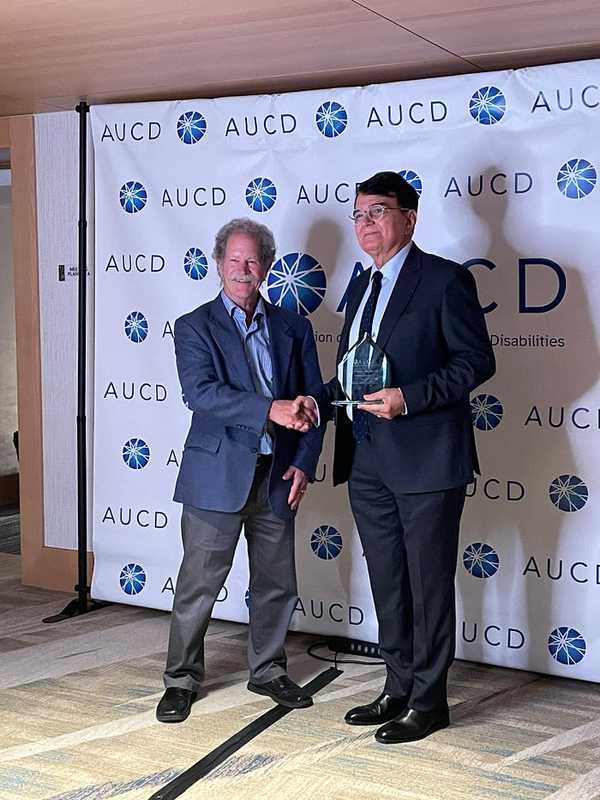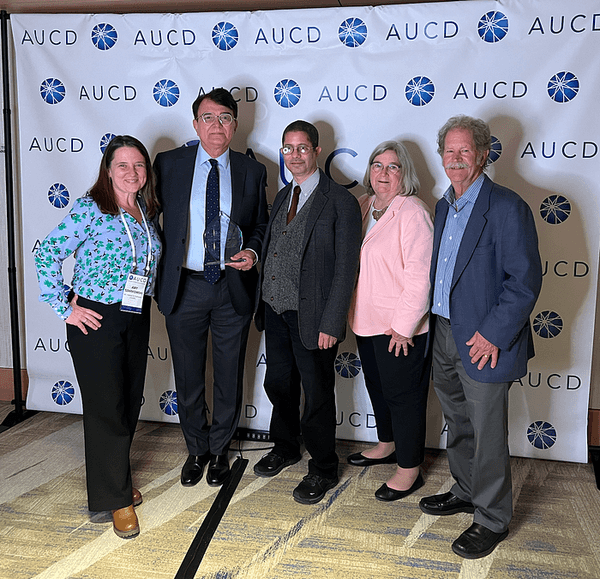UMass Boston LEND Director of Psychiatry Dr. Kerim Munir awarded the AUCD International Service Award
LEND Director Emeritus Dr. David Helm and Social Worker/ LEND & UCEDD Alumna Beverley Gilligan nominated Dr. Kerim Munir for the AUCD International Service Award. The following blog post is part of David and Beverley’s nomination letter to the AUCD Awards Committee.
Kerim Munir accepting his award.
We are proud to announce that Dr. Kerim M. Munir has been awarded the AUCD International Service Award! Dr. Munir is Director of Psychiatry at the ICI’s LEND program (Leadership Education in Neurodevelopmental and Related Disabilities) at Boston Children’s Hospital.
Dr. Munir has made a huge impact on international perceptions and understanding of people with mental health concerns, autism, and related disabilities. His leadership and work both with international professional organizations, for instance the World Health Organization (WHO) and the World Psychiatric Association (WPA), has been instrumental in changing perspectives across the world.
In 1999, there was an earthquake in Turkey following which Dr. Munir traveled to Turkey to provide psychiatric services under UNICEF. In 2000, he presented on the Psychosocial Schools Project Marmara Earthquake UNICEF Recovery Program for Children to an international audience. Since that time, he has made close to 100 international presentations, often supporting and partnering with his international fellows or former mentees.
His understanding and research into comorbidity and social determinants of developmental
psychopathology has led to his leadership roles in a number of international associations and has been the foundation for his multiple National Institutes of Health (NIH) research and training grants.
Dr. Munir has received continuous funding from NIH since 2001, supporting more than 90 international graduate students and postdoctoral fellows to come to Boston for research training in child mental health, intellectual and developmental disabilities, and research ethics. They return to their home countries often for leadership positions and careers in health and research. For example, Dr. Ozgur Oner, one of the first fellows, is now Professor and Head of Child and Adolescent Psychiatry at Bahcesehir University, Faculty of Medicine, and continues to be involved in lecturing, mentoring, and research.
From 2010–2019, Dr. Munir hosted the ‘Research Methods in Ethics & Health Science (RMHS)’ Summer Institute at Koc University in Turkey, where over 300 international fellows and scholars attended, giving them an opportunity to discuss and present their work. In June 2023, Dr. Munir, with the assistance of Professor Daniel Wikler of the Harvard TH Chan School of Public Health, resumed a modified version of this program for 30 participants in Kyrgyzstan and Uzbekistan, continuing the goal of generating and sustaining global mental health and bioethics researchers in high and low- and middle-income countries.
Dr. Munir is also currently a co-Investigator on a Fogarty/NIH RO1 grant ‘Optimizing prevention approaches for children reintegrating from orphanages in Azerbaijan’ with Pl Leyla lsmayliova, University of Chicago, for the grant period 2019–2024. The Site Director in Azerbaijan is Narmin Guliyeva, MD an Associate Professor of Child & Adolescent Psychiatry, who was an international fellow in Dr. Munir’s program studying in Boston in 2016.
Thus, for over 20 years Dr. Munir has played a key role in training physicians and psychologists from Turkey, Azerbaijan, Kazakhstan, Kyrgyzstan, Uzbekistan, and throughout Central Asia.
As noted above, there have been over 90 fellows who have come to this country to study with Dr. Munir and while they reside in Boston for 3–6 months many of these fellows would also join LEND program activities as their schedules permitted. The impact back in their home countries has been enormous and continues to develop. The impact these scholars imparted onto our other long-term LEND fellows was also enlightening.
The list of accomplishments goes on and on, but all indicate Dr. Munir’s international influence in the world of disabilities has been and continues to be substantial.
David Helm shakes Kerim Munir’s hand after he receives the award.
Kerim Munir (second from left) joined his colleagues, (L-R) Amy Szarkowski, Gyasi Burks-Abbott, Cindy Thomas and David Helm for photo after receiving his award. Kerim is holding the award and the group is standing in front of an AUCD background.
